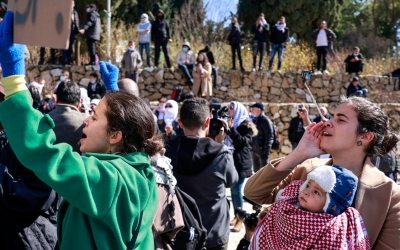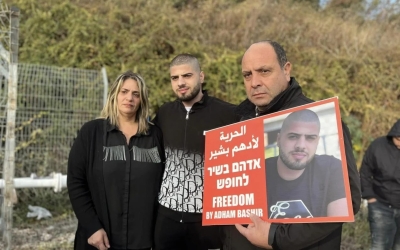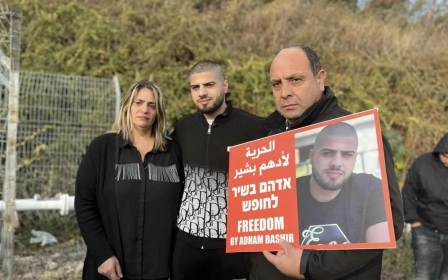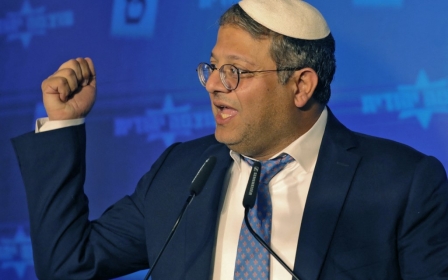How the new 'Ben-Gvir law' will further repress Palestinians
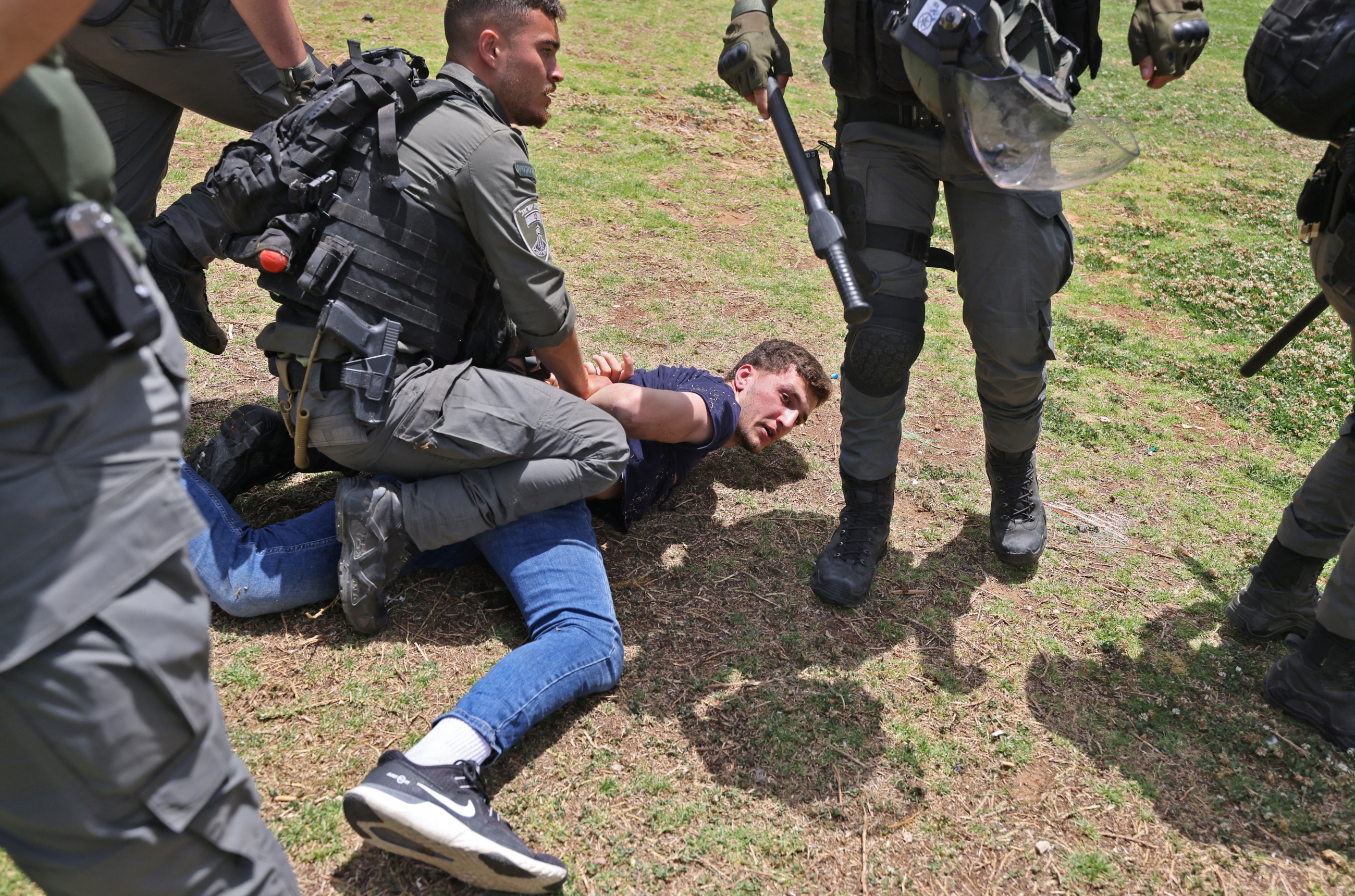
On Wednesday, 28 December, the Israeli parliament passed a bill that will give far-right politician Itamar Ben-Gvir authority over the police.
The "Ben-Gvir law" will greatly expand the power of the soon-to-be minister of national security.
The goal of the new law is to give Ben-Gvir full authority over the police in order to turn them into a weapon to spread his ideology
The law has been met with vocal opposition among Palestinians, human rights activists and organisations such as Adalah, as well as from Israeli civil society institutions, including the Association for Citizen Rights Israel and the Public Committee Against Torture in Israel (PCATI), which noted the great and real dangers posed by this change.
PCATI relayed its fear that the proposed law would lead to an increase in cases of torture, abuse, and degrading treatment by police officers targeting activists and demonstrators, mainly Palestinians and minorities in the country.
The Israeli police already treats Palestinians in a politicised and unfair manner, as we can see through our work as lawyers and activists, and through the complaints received by human rights organisations, especially during the Karamah "dignity" Uprising.
'Gross' violations
Even before a change in the law, Israeli police officers were carrying out widespread and illegal violations against Palestinians inside the 1948 occupied territories, and in Jerusalem, and the Border Guard of the Israeli police continue to carry out gross violations during arrest.
The Damascus Gate, also known as Bab al-'Amud, in Jerusalem, has seen brutal arrests and the use of batons and tear gas and waste water to disperse demonstrators - dragging them to police stations, and beating and brutalising them while the police refuse to install surveillance cameras, which allows them to continue their violence unchecked.
The Negev has witnessed the same practices, especially during the Karamah uprising, with Israeli police targeting Palestinian youths and unleashing fascist militias that stormed and attacked Palestinian neighbourhoods.
This cruel and degrading treatment by the police often reaches the point of torture, which is prohibited according to international conventions and according to the Israeli Supreme Court itself - but the practices continue nonetheless.
This is helped by the absence of a specific law that prohibits torture and defines it as a crime to this day in Israel.
The latest legislative proposal came immediately after Ben-Gvir stipulated changing the name of the Ministry of Internal Security to the Ministry of National Security as a condition for participating in the coalition government.
Following the 2018 Jewish Nation-State Law, Israeli Jews were granted legal superiority over other ethnic communities in the country, and the government codified treating Palestinians as second-class citizens.
A 'dangerous' shift
Following the passing of Ben-Gvir's law, the ministry once responsible for the internal security of the state will now become responsible for the national security of the state, which is a broader and more dangerous concept based on discrimination and inequality.
But the following are some of the dangers and concerns about this new legislation:
The amendment proposes to change clauses 8-9 of the law so that the police become directly under the command of the political echelon and managed by the incoming Minister of National Security, that is Ben-Gvir himself.
The amendment further calls for placing the task of "monitoring police work" under the authority of the same minister. This is the situation today, which gives Ben-Gvir the power to "manage the police in all its activities" which "shall be subject to the policy and general principles determined by the minister".
The goal of this new change is to give the minister full authority over the police, and to be able to seize the powers available to the police chief and transfer them to himself so he can use the police as a weapon to spread his dangerous ideology.
Thus, the minister can decide to target certain groups and subject them to police measures and repression to the point of torture, and to deny certain groups, especially Palestinians, the right to demonstrate.
The minister can also decide to interfere in and prevent certain activities, or prevent, for example, protests against him and his party, and so on, or to interfere in the course of an investigation, or dictate the size and shape of certain arrests.
Eventually, the police will become a direct tool in the hands of Ben-Gvir, serving his ideology and suppressing opponents, which will rapidly lead to an even more repressive and fascist regime than that which we have today.
More fascist laws to come
Ben-Gvir's public statements against Palestinians in the Israeli parliament and in the media, and the statements of his ally Bezalel Smotrich against Israeli human rights institutions - and his calls to prosecute them - are signs of what is to come with the passage of this devastating law.
It is also feared that this amendment will be followed by a series of racist and fascist laws that will put Palestinians, including citizens of the state, in direct danger.
One can only imagine how the police, which has acted with total impunity, will inflict even more violence and harm on Palestinians, particularly youths, once this law is binding
The amendment also proposes a change to the existing clause 9(b), and requires that the law allows the police chief under the minister to keep certain police instructions secret and not to publish them either in the law book or on the police website - or anywhere else.
This poses a danger and prevents transparency and accountability regarding violations and violent practices that could amount to torture during the dispersal of demonstrations, arrests, and investigations without the detainees and their attorneys having the ability to know what the rules are.
It further violates the principle that the law should be declared, published and clear; and even contradicts the principle of the right to know. Human rights organisations have warned of its danger.
The ideological core behind Ben-Gvir's proposed law is reflected in the law's attached summary, which states: "In the existing governmental system in Israel, the army implements the policies of the government and the minister and submits to their orders."
According to this, "it is proposed to implement similar arrangements in the police decree, in all matters related to the police's relationship with the government and the minister in charge".
At the heart of Ben-Gvir's thought is to equate the police, its work, and its minister with the army, its work, and its minister - subjugating the police entirely to the political echelon and its decisions.
If the mission of the army is, by definition, war and confronting enemies - from the outside, and the role of the police is to maintain law and order at home on an equal basis among citizens, then Ben-Gvir wants the police to play the role of the army at home, and to deal with citizens as enemies - not all citizens, but those whom Ben-Gvir targets in his speeches, statements, and partisan ideology: Palestinians.
This law will most certainly open the door to more abuse, violations, and torture of Palestinians.
As I covered in a previous article, the police and then the prosecution deal with Palestinian and Jewish citizens of Israel in a discriminatory manner, with the percentage of indictments against Palestinians reaching 88.8 percent.
The Anti-Terrorism law was also used against Palestinians, leading to harsh prison sentences that stretch to dozens of years, while Jewish Israelis who assault Palestinians and attack their neighbourhoods are not subjected to the same harsh sentences.
It should be noted that being critical of this change to the law does not mean that Israeli police in its current form is acceptable or in any way upholds the standards of transparency and integrity - but the matter will only get worse.
The Public Prosecution Office's report issued in November 2022, which includes a section on the Police Investigations Department (Mahash), indicates that 4,401 complaints were filed in 2021 against the police for criminal offences committed by police officers, an increase of eight percent from the year before, and a 34 percent increase from 2019.
One can only imagine how the police, which has acted with total impunity, will inflict even more violence and harm on Palestinians, particularly youths, once this law is binding.
The views expressed in this article belong to the author and do not necessarily reflect the editorial policy of Middle East Eye.
Middle East Eye propose une couverture et une analyse indépendantes et incomparables du Moyen-Orient, de l’Afrique du Nord et d’autres régions du monde. Pour en savoir plus sur la reprise de ce contenu et les frais qui s’appliquent, veuillez remplir ce formulaire [en anglais]. Pour en savoir plus sur MEE, cliquez ici [en anglais].



